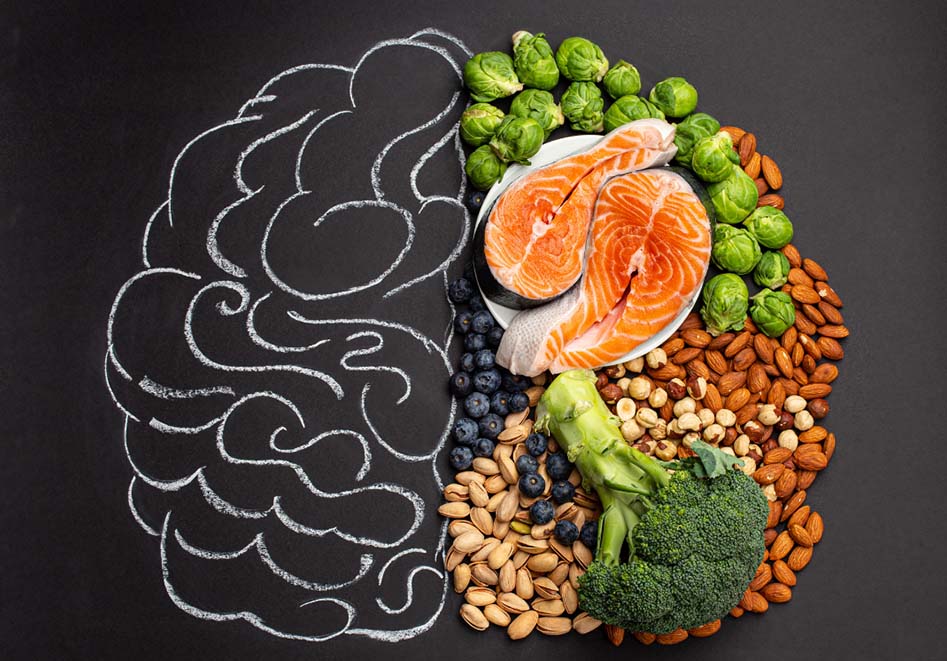Why is a healthy gut important? There is an interrelationship between our brain and our gut. With the gut microbiome, the food choices we make contribute to healthy neurotransmitter production, such as serotonin and dopamine, which are necessary for good mental health.
It’s surprising for most people to realize that serotonin is almost exclusively created in the gut – 95%, to be exact.
If the balance of your gut bacteria is not healthy, that's going to affect your neurotransmitter production and function. That’s why so many get on the SSRI, antidepressant or antianxiety medication roller coaster. They are just putting a bandaid on the problem because the real issue is a production issue within the gut.
The good news is that gut repair is possible and that means restoring one’s mental health. Using fasting to improve anxiety and depression is a technique that many people use as a holistic remedy not to medicate ADHD, anxiety, depression, or other clinical conditions. One way that it improves mental health is by increasing gut microbiota.
Intermittent fasting is about digestive rest and giving the gut a chance to remove toxins and restore itself. Fasting has numerous physiological and psychological health benefits.
Time restricted feeding and the effects of intermittent fasting can be powerful.
Ultimately, when we make better food choices, with a focus on anti-inflammatory, nutrient dense foods, it positively impacts mood, attention, and brain health in general because of that gut-brain connection. Whether it is a simple but effective mediterranean diet or adding in one smoothie a day, these food choices have an immediate effect on brain health.
Having a healthy microbiome can create balance within the gut to help reduce the symptoms associated with anxiety and depression. It can almost be shocking for people as to just how much control they have over their anxiety and depression through dietary changes.
There are many physiological benefits of fasting but one huge benefit of fasting is improved mental health. By improving gut health, there is a positive impact on neurotransmitter function in the brain because of the gut-brain connection.
Why is Serotonin Important for Anxiety and Depression?
The neurotransmitter serotonin helps to regulate many functions of our brain and body, and low levels (serotonin deficiency) are associated with many mental health conditions including anxiety, OCD and depression.
An anxious brain is a fear driven brain and that means making decisions, taking action, and connecting with others is hard. It also means that your brain is in a “rev state” and therefore more likely to experience stress, so one gets caught in a constant state of stress activation, which has mental and physical effects.
Symptoms of low serotonin levels include:
- Sleep cycle disturbances, sleep issues, and insomnia
- Depression and mood disorder
- Seasonal Affective Disorder (SAD)
- Substance abuse
- Eating disorders
- Hyperactive behaviors
- Anxiety, worry, and generalized anxiety disorder (GAD)
- Obsessions, and compulsive or impulsive behavior and OCD
- Phobias
- Panic attacks
- Agitation, irritability and aggression
- Poor memory and cognitive impairment
- Health issues such as: Irritable bowel (IBS), gastrointestinal issues, PMS and hormone dysfunction, weight issues, low blood pressure, fatigue, fibromyalgia, chronic pain, and migraines headaches
What is the Connection Between Melatonin and Mental Health?
So, a healthy gut is important because the neurotransmitter serotonin is needed for normal mood function. What most people aren’t aware of is that serotonin is the precursor to melatonin.
Melatonin is a hormone that regulates our sleep-wake cycle. Our brain produces melatonin in response to darkness, which is called “dim-light melatonin onset.”
Those with low serotonin levels, the precursor to melatonin, spend less time in restorative non-REM sleep over the course of the night and that affects brain and mental health in and of itself.
Melatonin also functions as an antioxidant and has anti-inflammatory properties to help regulate reproductive and hormone function. Melatonin is a master antioxidant in the body, so it's not just a sleep hormone. And healthy hormones are a necessary part of mood, memory, and other brain functions.
It is important to remember that when we have a healthier microbiome, we're making more serotonin, we're going to make more melatonin, we're going to have better quality and sleep deeper as we have healthy sleep cycles. The better our sleep, the more that translates into some profound benefits for our health.
How Does Blood Sugar Impact Mental Health?
When we have a regular fasting period, not only do we lower blood sugar and insulin, we can prevent long term issues such as type 2 diabetes and other metabolic conditions that affect mental health.
Dysregulated blood sugar and high insulin have long been associated with cognitive and mood issues, as they can affect attention, memory, mood, and stress levels.
The more constant and balanced our blood sugar and insulin levels, the better one’s mood, attention, and thinking is. Even a 12 hour fasting window can benefit the brain through a process called autophagy, where the cells “get cleaned” which optimizes health.
It may not be easy to get children with ARFID, eating disorders, and sensory issues to eat more consistent protein and fats, but that is an effective way to balance blood sugar. And with balanced blood sugar and insulin levels, kids with behavioral and emotional issues are more regulated and that means they are easier to parent and learn from us.
In our BrainBehaviorReset™ Program, we focus on where kids and families are at and start slow. That might mean adding one nutrient dense food or swap outs for healthier alternatives. Little changes can have a big effects on mental health and help to calm the brain.
Calming the brain with science-backed methods, such as neurofeedback, PEMF, and magnesium are solutions for mental health that we need to talk more about.
Citations:
Asnicar, F., Berry, S. E., Valdes, A. M., Nguyen, L. H., Piccinno, G., Drew, D. A., Leeming, E., Gibson, R., Le Roy, C., Khatib, H. A., Francis, L., Mazidi, M., Mompeo, O., Valles-Colomer, M., Tett, A., Beghini, F., Dubois, L., Bazzani, D., Thomas, A. M., Mirzayi, C., … Segata, N. (2021). Microbiome connections with host metabolism and habitual diet from 1,098 deeply phenotyped individuals. Nature medicine, 27(2), 321–332. https://doi.org/10.1038/s41591-020-01183-8
Frank, J., Gupta, A., Osadchiy, V., & Mayer, E. A. (2021). Brain-Gut-Microbiome Interactions and Intermittent Fasting in Obesity. Nutrients, 13(2), 584. https://doi.org/10.3390/nu13020584
Always remember… “Calm Brain, Happy Family™”
Disclaimer: This article is not intended to give health advice and it is recommended to consult with a physician before beginning any new wellness regime.
Are you looking for SOLUTIONS for your struggling child or teen?
Dr. Roseann and her team are all about solutions, so you are in the right place!
There are 3 ways to work with Dr. Roseann:
- In-person at her Ridgefield, CT center
- Virtually with her at home neurofeedback and coaching programs
- By getting her BrainBehaviorReset™ Toolkit
You can get her books for parents and professionals, including: It’s Gonna Be OK™: Proven Ways to Improve Your Child’s Mental Health, Teletherapy Toolkit™ and Brain Under Attack: A Resource For Parents and Caregivers of Children With PANS, PANDAS, and Autoimmune Encephalopathy.
If you are a business or organization that needs proactive guidance to support employee mental health or an organization looking for a brand representative, check out Dr. Roseann’s professional speaking page to see how we can work together.
Dr. Roseann is a Children’s Mental Health Expert and Therapist who has been featured in/on hundreds of media outlets including, CBS, NBC, FOX News, PIX11 NYC, The New York Times, The Washington Post,, Business Insider, USA Today, CNET, Marth Stewart, and PARENTS. FORBES called her, “A thought leader in children’s mental health.”
She is the founder and director of The Global Institute of Children’s Mental Health and Dr. Roseann Capanna-Hodge. Dr. Roseann is a Board Certified Neurofeedback (BCN) Practitioner, a Board Member of the Northeast Region Biofeedback Society (NRBS), Certified Integrative Medicine Mental Health Provider (CMHIMP) and an Amen Clinic Certified Brain Health Coach. She is also a member of The International Lyme Disease and Associated Disease Society (ILADS), The American Psychological Association (APA), Anxiety and Depression Association of America (ADAA) National Association of School Psychologists (NASP), International OCD Foundation (IOCDF) International Society for Neurofeedback and Research (ISNR) and The Association of Applied Psychophysiology and Biofeedback (AAPB).
© Roseann-Capanna-Hodge, LLC 2022
You can get her books for parents and professionals, including: It’s Gonna Be OK™: Proven Ways to Improve Your Child’s Mental Health, Teletherapy Toolkit™ and Brain Under Attack: A Resource For Parents and Caregivers of Children With PANS, PANDAS, and Autoimmune Encephalopathy.
If you are a business or organization that needs proactive guidance to support employee mental health or an organization looking for a brand representative, check out Dr. Roseann’s media page and professional speaking page to see how we can work together.
Dr. Roseann is a Children’s Mental Health Expert and Therapist who has been featured in/on hundreds of media outlets including, CBS, NBC, FOX News, PIX11 NYC, The New York Times, The Washington Post,, Business Insider, USA Today, CNET, Marth Stewart, and PARENTS. FORBES called her, “A thought leader in children’s mental health.”

She is the founder and director of The Global Institute of Children’s Mental Health and Dr. Roseann Capanna-Hodge. Dr. Roseann is a Board Certified Neurofeedback (BCN) Practitioner, a Board Member of the Northeast Region Biofeedback Society (NRBS), Certified Integrative Medicine Mental Health Provider (CMHIMP) and an Amen Clinic Certified Brain Health Coach. She is also a member of The International Lyme Disease and Associated Disease Society (ILADS), The American Psychological Association (APA), Anxiety and Depression Association of America (ADAA) National Association of School Psychologists (NASP), International OCD Foundation (IOCDF) International Society for Neurofeedback and Research (ISNR) and The Association of Applied Psychophysiology and Biofeedback (AAPB).
© Roseann-Capanna-Hodge, LLC 2023
Disclaimer: This article is not intended to give health advice and it is recommended to consult with a physician before beginning any new wellness regime. *The effectiveness of diagnosis and treatment vary by patient and condition. Dr. Roseann Capanna-Hodge, LLC does not guarantee certain results.













